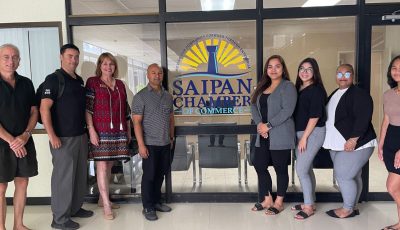CHCC program keeps local nurses on island
The Commonwealth Healthcare Corp. financial assistance program was created last year for the hospital to wean itself off from its dependence on foreign nurses and cultivate nurses that graduate from the Northern Marianas College.
CHCC public information officer Sami Birmingham-Babauta said that the CHCC financial assistance program is not money to send students to nursing school.
“We currently have nurses working at the hospital who were involved in the program. It’s not so much[about] students get[ting] money to go to school as it is really financial assistance [so] they don’t pay for the National Council Licensure Examination or any of the study and review materials,” she said.
Birmingham-Babauta said a nursing graduate from NMC who enrolls in the program is given one year to work as a graduate nurse at CHCC.
“This is somebody who hasn’t taken the NCLEX yet… This is great for hands-on learners because they get to experience what they see and study from their books and they get two weeks off prior to taking the NCLEX,” she said.
While working at CHCC and preparing for the NCLEX, the nursing graduate gets paid for hours put in at the hospital.
“They get paid wages while working at CHCC as they have a contract and they are paid as a graduate nurse. This is a common program in the [United] States too,” Birmingham-Babauta said
“In the event they pass the NCLEX exam, they are given a new contract as a licensed registered nurse or licensed nurse practitioner for another two years at CHCC.
“In the event they do not pass the NCLEX, they can retake the exam but that would forfeit [their chance of] working at CHCC because the program is geared to give the new nursing graduates hands-on study paired with textbook study before the NCLEX exam,” she added.
In an earlier interview, CHCC CEO Esther Muna said the hospital is working on providing incentives for students who want to pursue nursing and eventually hire them.
“We are finding ways how we can provide incentives for students who are pursuing the course of nursing and we talked about incentives like [student] loan repayment and provide bonuses if you sign a contract with CHCC because giving incentives is a practice in the U.S.,” she said.
“We love our [foreign workers] but the reality is we also have the young generation that are coming in who…are passionately pursuing degrees,” she added.
Hiring nurses locally is also one of the reasons why CHCC is not aggressively applying for H1-B nurses.
“The law specifically says that if you are going to [petition] a nurse for an H1-B visa…one requirement is that the applicant must have a bachelor’s degree. The reason we opted against it is we are basically preserving the pipeline of NMC because, if we are going to require that everyone has a bachelor’s degree, then [foreign nurses] that have bachelor’s degrees can be processed as H1-Bs,” she said.
“If we do that, it means we are blocking the college students that are coming from NMC. We don’t want to do that as we want to preserve our pipeline, preserve local hires, and also take care of those who have been here for quite a long time,” she added.
Birmingham-Babauta said the program has been effective in terms of cultivating the local workforce.
“I think it’s really great that the program is established as we are able to recognize that we have graduate nurses and kind of mimic other jurisdictions out there in how they nurture and handle their graduate nurses,” she said
“We’re proud that we’re able to provide a learning environment for student nurses, especially for those who find it easier to learn what they practice and experience. We see the success of that when they pass the NCLEX on their first try. CHCC is very excited that we are able to offer that kind of learning experience,” Birmingham-Babauta added.



























